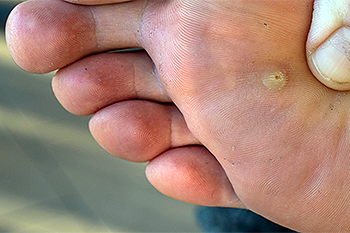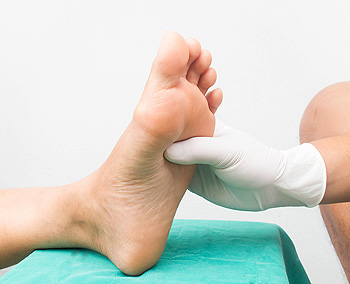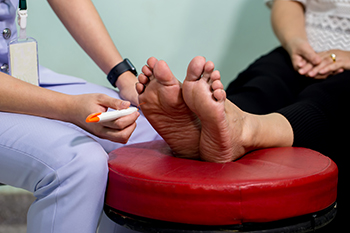Connect With Us
Blog
Items filtered by date: November 2023
Decoding the Telltale Symptoms of Plantar Warts

Plantar warts, though often benign, leave their mark on the soles of your feet with distinctive symptoms that merit attention. Typically emerging as flat or slightly raised growths, these warts exhibit a rough texture and may feature small black dots known as wart seeds, caused by clotted blood vessels. While the appearance is unmistakable, it is the discomfort that often draws attention. Plantar warts can cause pain or tenderness, especially while standing or walking, as the pressure on the wart exacerbates the discomfort. The surrounding skin may take on a calloused appearance, and the warts themselves can vary in size. Plantar warts thrive in warm, moist environments, making them frequent visitors to communal spaces like swimming pools or locker rooms. Recognizing these symptoms enables early identification and intervention, ensuring a more comfortable and expedited resolution of this common foot ailment. Plantar warts require the medical attention of a podiatrist, and if you have this ailment, it is suggested that you contact this type of doctor who can offer effective remedies for the accompanying pain and discomfort.
Plantar warts can be very uncomfortable. If you need your feet checked, contact one of our podiatrists from Sutera and Jones Surgical Podiatry. Our doctors will assist you with all of your foot and ankle needs.
About Plantar Warts
Plantar warts are the result of HPV, or human papillomavirus, getting into open wounds on the feet. They are mostly found on the heels or balls of the feet.
While plantar warts are generally harmless, those experiencing excessive pain or those suffering from diabetes or a compromised immune system require immediate medical care. Plantar warts are easily diagnosed, usually through scraping off a bit of rough skin or by getting a biopsy.
Symptoms
- Lesions on the bottom of your feet, usually rough and grainy
- Hard or thick callused spots
- Wart seeds, which are small clotted blood vessels that look like little black spots
- Pain, discomfort, or tenderness of your feet when walking or standing
Treatment
- Freezing
- Electric tool removal
- Laser Treatment
- Topical Creams (prescription only)
- Over-the-counter medications
To help prevent developing plantar warts, avoid walking barefoot over abrasive surfaces that can cause cuts or wounds for HPV to get into. Avoiding direct contact with other warts, as well as not picking or rubbing existing warts, can help prevent the further spread of plantar warts. However, if you think you have developed plantar warts, speak to your podiatrist. He or she can diagnose the warts on your feet and recommend the appropriate treatment options.
If you have any questions please feel free to contact one of our offices located in Media, Glen Mills, Riddle Memorial Hospital, and Concordville, PA . We offer the newest diagnostic and treatment technologies for all your foot and ankle needs.
Causes of Peripheral and Diabetic Neuropathy

Peripheral neuropathy affects parts of the nervous system that send signals to the extremities. Symptoms typically emerge in the toes and feet before symmetrically progressing up the legs. In diabetic neuropathy, another prevalent type, symptoms initiate in both feet, extend to the calves, and may reach the hands. Symptoms include a tingling sensation, burning pain, loss of feeling, and the inability to sense temperature or vibration. While diabetic neuropathy can cause tingling, numbness, and reduced sensation, weakness is less prominent. Notably, a significant number of individuals with diabetic neuropathy may not experience pain, despite reduced sensation. This puts them at risk of neglecting proper foot care and potentially leading to serious injuries, or in severe cases, limb loss. Diabetes is a major contributor to peripheral neuropathy, and nerve compression, excessive alcohol consumption, toxin exposure, and certain medications such chemotherapy can also cause this condition. Autoimmune diseases, hereditary conditions, thyroid disease, and kidney or liver diseases are other potential triggers. If you believe you are suffering from peripheral or diabetic neuropathy in the feet, it is suggested that you make an appointment with a podiatrist for an exam and treatment options.
Neuropathy
Neuropathy can be a potentially serious condition, especially if it is left undiagnosed. If you have any concerns that you may be experiencing nerve loss in your feet, consult with one of our podiatrists from Sutera and Jones Surgical Podiatry. Our doctors will assess your condition and provide you with quality foot and ankle treatment for neuropathy.
What Is Neuropathy?
Neuropathy is a condition that leads to damage to the nerves in the body. Peripheral neuropathy, or neuropathy that affects your peripheral nervous system, usually occurs in the feet. Neuropathy can be triggered by a number of different causes. Such causes include diabetes, infections, cancers, disorders, and toxic substances.
Symptoms of Neuropathy Include:
- Numbness
- Sensation loss
- Prickling and tingling sensations
- Throbbing, freezing, burning pains
- Muscle weakness
Those with diabetes are at serious risk due to being unable to feel an ulcer on their feet. Diabetics usually also suffer from poor blood circulation. This can lead to the wound not healing, infections occurring, and the limb may have to be amputated.
Treatment
To treat neuropathy in the foot, podiatrists will first diagnose the cause of the neuropathy. Figuring out the underlying cause of the neuropathy will allow the podiatrist to prescribe the best treatment, whether it be caused by diabetes, toxic substance exposure, infection, etc. If the nerve has not died, then it’s possible that sensation may be able to return to the foot.
Pain medication may be issued for pain. Electrical nerve stimulation can be used to stimulate nerves. If the neuropathy is caused from pressure on the nerves, then surgery may be necessary.
If you have any questions, please feel free to contact one of our offices located in Media, Glen Mills, Riddle Memorial Hospital, and Concordville, PA . We offer the newest diagnostic and treatment technologies for all your foot care needs.
How Diabetes Can Affect the Feet

Diabetes is a complex condition that affects various parts of the body, and one often underestimated area is the feet. One of the most common diabetes-related foot problems is neuropathy, which can result in a loss of sensation. Additionally, it can cause tingling, pain, or weakness in the foot. This loss of sensation can lead to injuries that are unnoticed, such as stepping on a tack or developing a blister, which can worsen and become infected. In addition, nerve damage can also alter the shape of your feet and toes, making it essential to avoid wearing ill-fitting shoes. Having high blood sugar levels for an extended period of time can also cause blood vessels in the foot and leg to narrow and harden, inhibiting proper blood flow to the extremities. This poor circulation to the feet makes them less able to heal and fight off infections and can result in the development of ulcers. If left unattended, foot ulcers can turn into gangrene and possibly the loss of a limb. Wearing proper footwear, lifestyle changes, and working closely with your podiatrist are essential steps in managing diabetes and protecting your feet from complications. If you have foot problems that result from diabetes, it is suggested that you make regular appointments to see a podiatrist for checkups.
Diabetic foot care is important in preventing foot ailments such as ulcers. If you are suffering from diabetes or have any other concerns about your feet, contact one of our podiatrists from Sutera and Jones Surgical Podiatry. Our doctors can provide the care you need to keep you pain-free and on your feet.
Diabetic Foot Care
Diabetes affects millions of people every year. The condition can damage blood vessels in many parts of the body, especially the feet. Because of this, taking care of your feet is essential if you have diabetes, and having a podiatrist help monitor your foot health is highly recommended.
The Importance of Caring for Your Feet
- Routinely inspect your feet for bruises or sores.
- Wear socks that fit your feet comfortably.
- Wear comfortable shoes that provide adequate support.
Patients with diabetes should have their doctor monitor their blood levels, as blood sugar levels play such a huge role in diabetic care. Monitoring these levels on a regular basis is highly advised.
It is always best to inform your healthcare professional of any concerns you may have regarding your feet, especially for diabetic patients. Early treatment and routine foot examinations are keys to maintaining proper health, especially because severe complications can arise if proper treatment is not applied.
If you have any questions please feel free to contact one of our offices located in Media, Glen Mills, Riddle Memorial Hospital, and Concordville, PA . We offer the newest diagnostic and treatment technologies for all your foot and ankle needs.
Plantar Warts Can Be Treated!
Foot Deformities and High Heels

High heels, while often a stylish footwear choice, can lead to foot problems for many women. Regularly wearing these types of shoes can result in the feet becoming flatter, causing the big toe to deviate abnormally, either inwards or outwards. This is not just limited to the big toe, as the little toe can also be affected, tending to bend inwards. The altered posture and pressure points created by the elevated heel height can lead to various deformities. For women who frequently choose to wear high heels, it is essential to recognize the potential long-term effect on their foot health. If you enjoy wearing high heels, it is suggested that you make an appointment with a podiatrist who can offer guidance on how to wear heels in a way that minimizes harm. They can also suggest alternative fashionable footwear options that provide a better balance between fashion and foot health. Taking these precautions may help to prevent long-term foot issues.
High heels have a history of causing foot and ankle problems. If you have any concerns about your feet or ankles, contact one of our podiatrists from Sutera and Jones Surgical Podiatry. Our doctors can provide the care you need to keep you pain-free and on your feet.
Effects of High Heels on the Feet
High heels are popular shoes among women because of their many styles and societal appeal. Despite this, high heels can still cause many health problems if worn too frequently.
Which Parts of My Body Will Be Affected by High Heels?
- Ankle Joints
- Achilles Tendon – May shorten and stiffen with prolonged wear
- Balls of the Feet
- Knees – Heels cause the knees to bend constantly, creating stress on them
- Back – They decrease the spine’s ability to absorb shock, which may lead to back pain. The vertebrae of the lower back may compress.
What Kinds of Foot Problems Can Develop from Wearing High Heels?
- Corns
- Calluses
- Hammertoe
- Bunions
- Morton’s Neuroma
- Plantar Fasciitis
How Can I Still Wear High Heels and Maintain Foot Health?
If you want to wear high heeled shoes, make sure that you are not wearing them every day, as this will help prevent long term physical problems. Try wearing thicker heels as opposed to stilettos to distribute weight more evenly across the feet. Always make sure you are wearing the proper shoes for the right occasion, such as sneakers for exercising. If you walk to work, try carrying your heels with you and changing into them once you arrive at work. Adding inserts to your heels can help cushion your feet and absorb shock. Full foot inserts or metatarsal pads are available.
If you have any questions please feel free to contact one of our offices located in Media, Glen Mills, Riddle Memorial Hospital, and Concordville, PA . We offer the newest diagnostic and treatment technologies for all your foot and ankle needs.
Blog Archives
- March 2025
- February 2025
- January 2025
- December 2024
- November 2024
- October 2024
- September 2024
- August 2024
- July 2024
- June 2024
- May 2024
- April 2024
- March 2024
- February 2024
- January 2024
- December 2023
- November 2023
- October 2023
- September 2023
- August 2023
- July 2023
- June 2023
- May 2023
- April 2023
- March 2023
- February 2023
- January 2023
- December 2022
- November 2022
- October 2022
- September 2022
- August 2022
- July 2022
- June 2022
- May 2022
- April 2022
- March 2022
- February 2022
- January 2022
- December 2021
- November 2021
- October 2021
- September 2021
- August 2021
- July 2021
- June 2021
- May 2021
- April 2021
- March 2021
- February 2021
- January 2021
- December 2020
- November 2020
- October 2020
- September 2020
- August 2020
- July 2020
- June 2020
- May 2020
- April 2020
- March 2020
- February 2020
- January 2020
- December 2019
- November 2019
- October 2019
- September 2019
- August 2019
- July 2019
- June 2019
- May 2019
- April 2019
- March 2019
- February 2019
- January 2019
- December 2018
- November 2018
- October 2018
- September 2018
- August 2018
- July 2018
- June 2018
- May 2018
- April 2018
- March 2018
- February 2018
- January 2018
- December 2017
- November 2017
- October 2017
- September 2017
- August 2017
- July 2017
- June 2017
- May 2017
- April 2017
- March 2017
- February 2017
- January 2017
- December 2016
- November 2016
- October 2016
- September 2016
- August 2016
- July 2016
- June 2016
- May 2016
- April 2016
- March 2016
- February 2016
- January 2016
- December 2015
- November 2015
- October 2015
- September 2015
- August 2015
- July 2015
- June 2015
- May 2015
- April 2015
- March 2015
- February 2015
- January 2015
- December 2014
- November 2014
- October 2014
- September 2014

